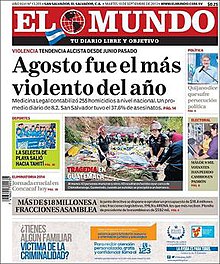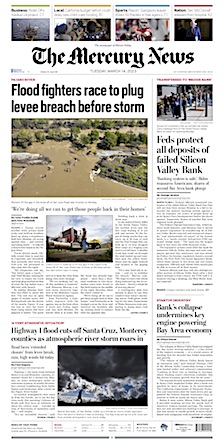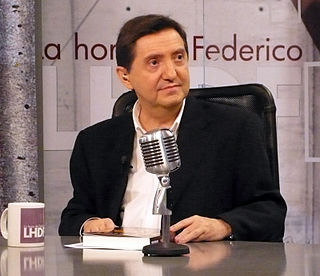| Diario Libre y Objetivo | |
 Front page of El Mundo in 2013 | |
| Type | Daily newspaper |
|---|---|
| Founded | 1967 |
| Language | Spanish |
| Headquarters | San Salvador, El Salvador |
| Website | |
El Mundo is a daily morning newspaper in El Salvador.
| Diario Libre y Objetivo | |
 Front page of El Mundo in 2013 | |
| Type | Daily newspaper |
|---|---|
| Founded | 1967 |
| Language | Spanish |
| Headquarters | San Salvador, El Salvador |
| Website | |
El Mundo is a daily morning newspaper in El Salvador.
It was first published on February 6, 1967, [1] by Dr. Juan José Borga. Several journalists who had worked at the Tribuna Libre joined the new paper, which was led by writer Waldo Chávez Velasco. [2]
Originally an evening paper (published Monday to Saturday), it switched to morning publication in 2004. [3]
A 1991 report described the paper as "less conservative" than the other leading daily papers in the country. [4]

ABC is a Spanish national daily newspaper. Founded in 1903, it is the second-largest general-interest newspaper in Spain, number one in Madrid, and the oldest newspaper still operating in Madrid. Along with El Mundo and El País, it is one of Spain's three newspapers of record.

El País is a Spanish-language daily newspaper in Spain. El País is based in the capital city of Madrid and it is owned by the Spanish media conglomerate PRISA.

The Mercury News is a morning daily newspaper published in San Jose, California, in the San Francisco Bay Area. It is published by the Bay Area News Group, a subsidiary of Media News Group which in turn is controlled by Alden Global Capital, a vulture fund. As of March 2013, it was the fifth largest daily newspaper in the United States, with a daily circulation of 611,194. As of 2018, the paper has a circulation of 324,500 daily and 415,200 on Sundays. As of 2021, this further declined. The Bay Area News Group no longer reports its circulation, but rather "readership". For 2021, they reported a "readership" of 312,700 adults daily.

Federico Jorge Jiménez Losantos, also known by his initials FJL, is a Spanish radio presenter and right-wing pundit, being most known for his successful radio talk show Es la mañana de Federico. He is also a TV host and literary and non-fiction author. A member of extreme-left organizations and participant in Barcelona's counter-cultural scene in the 1970s, he experienced a radical rightward drift, eventually becoming a journalistic guru for a far-right audience.
O Globo is a Brazilian newspaper based in Rio de Janeiro. O Globo is the leading daily newspaper in the country and the most prominent print publication in the Grupo Globo media conglomerate.

La Nación is an Argentine daily newspaper. As the country's leading conservative newspaper, La Nación's main competitor is the more liberal Clarín. It is regarded as a newspaper of record for Argentina.
Listín Diario is one of the leading newspapers in the Dominican Republic, and the oldest still being published.

Marca, stylised as MARCA, is Spain's national daily sport newspaper owned by Unidad Editorial. The newspaper focuses primarily on football, in particular the day-to-day activities of Real Madrid, FC Barcelona, and Atlético Madrid. It has a daily readership of over 2.5 million, the highest in Spain for a daily newspaper, and more than half of Spain's total sports readership, as of 2007.

La Vanguardia is a Spanish daily newspaper, founded in 1881. It is printed in Spanish and, since 3 May 2011, also in Catalan. It has its headquarters in Barcelona and is Catalonia's leading newspaper.
In the mass media in Bolivia there are nearly 200 privately owned television stations, but because rural regions of the country have few televisions and television reception is poor in many areas of the country, radio remains an important news disseminator. As of 2006, Bolivia had more than 480 radio stations, most of which were regional in scope. Bolivia also has eight national newspapers, in addition to many local ones. Of the national papers, four are based in La Paz, three in Santa Cruz, and one in Cochabamba. As of 2006, most Bolivians continued to get their news from newspapers and radio broadcasts.
La Cadena SER is Spain's premier radio network in terms of both seniority and audience share. The acronym SER stands for Sociedad Española de Radiodifusión.
Diario Co Latino is an alternative newspaper, published in San Salvador, El Salvador. The editorial team is currently headed by Francisco E. Valencia.
La Prensa Gráfica commonly known as La Prensa is a daily newspaper published in El Salvador by Grupo Dutriz. La Prensa is a mainstream metropolitan newspaper, and became one of the first newspapers to print in color in Central America.

The University of El Salvador or Universidad de El Salvador (UES) is the oldest and the most prominent university institution in El Salvador. It serves as the national university of the country. The main campus, Ciudad Universitaria, is located in the capital of San Salvador, but there are also branches of the university in other Salvadoran cities such as Santa Ana, San Miguel and San Vicente. The university counts a total of 9 faculties in its main campus and has a student population of more than 50,000.

El Mundo was a daily morning paper published in Buenos Aires, Argentina by Editorial Haynes company. It was launched on 14 May 1928 and circulated until mid-1967, when there was an unsuccessful attempt to convert it into an evening paper. Its publication during the Infamous Decade (1930–1943) provided reporting at a time of instability and repression. After Juan Perón's election in 1946, the publishing company was taken over by Peronistas, who forced the paper to take their line.

Ignacio Escolar García is a Spanish blogger and journalist. He currently leads the digital newspaper eldiario.es and he is also a political analyst in radio and television. He was founder and first director of the newspaper Público.

Los Secretos are a Spanish rock band founded in Madrid in 1978 and often associated with the movida madrileña movement.

Nuevas Ideas is a Salvadoran political party. The party was founded on 25 October 2017 by Nayib Bukele, the then-mayor of San Salvador, and was registered by the Supreme Electoral Court on 21 August 2018. The party's current president is Xavier Zablah Bukele, a cousin of Bukele who has served since March 2020.

General elections were held in El Salvador on 4 February 2024 to elect the president, vice president and all 60 deputies of the Legislative Assembly. This was followed by a second set of elections on 3 March 2024 in which voters elected all 44 mayors and municipal councils of the country's municipalities and all 20 of El Salvador's deputies to the Central American Parliament (PARLACEN).

Pollo Campestre is a fast food restaurant chain located in El Salvador. The restaurant specializes in serving fried chicken.